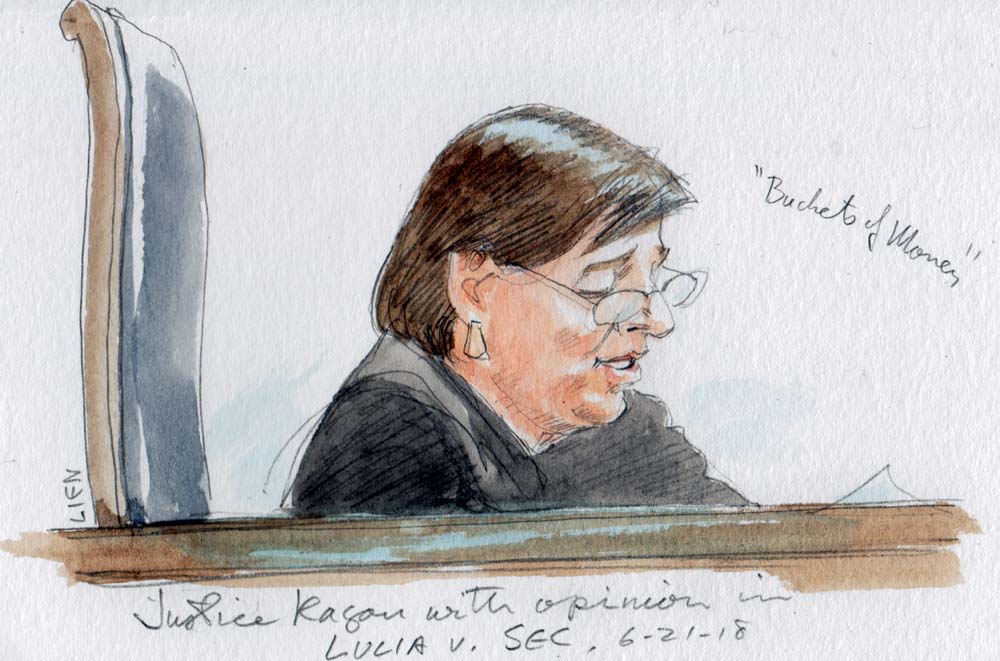Opinion analysis: Justices invalidate civil-service appointments of administrative law judges

on Jun 21, 2018 at 1:54 pm

It may be years before the implications of the Supreme Court’s opinion this morning in Lucia v. Securities and Exchange Commission are clear, but at first glance the opinion strikes a major blow at one of the centerpieces of the administrative state – the tradition of civil-service appointments of independent administrative law judges. Specifically, the court holds that the appointments of the administrative judges of the Securities and Exchange Commission violate the Constitution’s appointments clause because they were appointed by commission staff rather than the commission itself. Because the opinion contains no obvious narrowing limitations, it is entirely possible that it will extend to invalidate all existing appointments of ALJs.
The clause in question (Article 2, Section 2, Clause 2 of the Constitution) requires that all “officers” of the United States be appointed by the president, by the “courts of law,” or by the “heads of departments.” Because these ALJs (like the ALJs in most executive departments) were appointed by civil-service procedures, it is plain that their appointments are invalid if they are “officers” of the United States. The biggest problem for the defenders of those positions is the 1991 decision in Freytag v. Commissioner, in which the Supreme Court held that “special trial judges” of the tax court were officers for purposes of the appointments clause. It seemed clear at the argument that the justices faced three options: Follow Freytag and invalidate the appointments; read Freytag with narrow disingenuity and preserve the appointments; or reject the Freytag decision as out of touch with modern administrative realities.
Justice Elena Kagan’s succinct opinion for a six-member majority takes the first of those approaches. Reasoning that the judges held to be officers in Freytag “are near-carbon copies of the Commission’s ALJs,” she finds that “Freytag says everything necessary to decide this case.” The first part of Freytag’s two-part test is whether the judges “hold a continuing office established by law,” a point that all parties concede given the career full-time appointments that the ALJs hold. Thus, the only question subject to debate is whether the commission’s ALJs have sufficient discretion over sufficiently important functions to warrant the same treatment as the Freytag judges. And Kagan does not think that is a hard question, because “[b]oth sets of officials have all the authority needed to ensure fair and orderly adversarial hearings—including nearly all the tools of federal trial judges.” Summarizing the ability of the judges to take testimony, conduct trials and enforce compliance with discovery orders, she concludes that “point for point – straight from Freytag – the Commission’s ALJs have equivalent duties and powers as [the Freytag judges] in conducting adversarial inquiries.” Indeed, the most important distinction that Kagan sees between the Freytag judges and the SEC’s ALJs gives the SEC officers even more authority than the Freytag judges had; the tax court was obligated to review all opinions issued by the Freytag judges, while opinions of SEC ALJs automatically become final if the SEC decides not to review them.
After disposing of the merits so easily, the only remaining question is the proper remedy. That question is complicated by the decision of the SEC, after the Supreme Court decided to review Lucia, to ratify the appointments of the judges, so that the judge who heard Lucia’s case now holds an appointment from the commission itself. The court does not address the validity of those post-hoc appointments, but does go out of its way to hold that Raymond Lucia is entitled to another hearing before a new judge; Kagan explains that a second hearing before the same judge would not provide an appropriate remedy for the constitutional violation because that judge “cannot be expected to consider the matter as though he had not adjudicated it before.”
Kagan’s opinion garners the votes of six of the nine justices. On one side, Justices Clarence Thomas and Neil Gorsuch join her opinion, but argue that in future cases the Supreme Court should apply an historical standard that would treat as officers “all federal civil officials that perform an ongoing, statutory duty—no matter how important or significant the duty.” On the other side, Justice Stephen Breyer agrees that the appointments are invalid, although he relies on a narrow argument under the Administrative Procedure Act rather than the constitutional argument. He dissents from Kagan’s remedy, though, arguing that a second hearing before a now-duly-appointed judge should be enough for Lucia. The only dissent on the merits comes from Justice Sonia Sotomayor, joined by Justice Ruth Bader Ginsburg; emphasizing the importance of independent ALJs, she argues that Freytag should be narrowed to exclude the SEC ALJs from officer status.
Kagan’s opinion offers not a word to assess or mitigate the consequences of the Supreme Court’s holding for ALJs elsewhere in the executive branch. It is plain from the briefing that the great majority of those judges are in the Social Security Administration, though a substantial number of ALJs are scattered throughout other departments. Given the relatively fact-specific nature of the assessment in Kagan’s opinion, it is entirely possible that the authority granted to some of those judges could be distinguished from the authority granted to the ALJs of the SEC. Having said that, the briefing does not suggest that there is anything particularly unusual about the role that ALJs play in the SEC. Thus, although it is fair to expect future litigation on the point, it would not be at all surprising if Lucia ended up invalidating all of the existing systems for appointments of ALJs.



